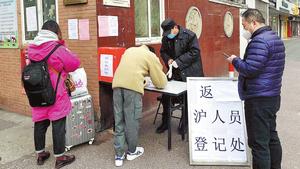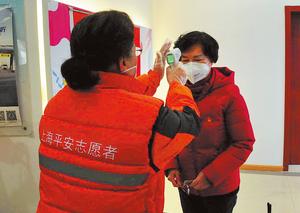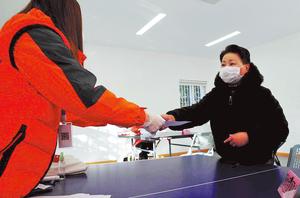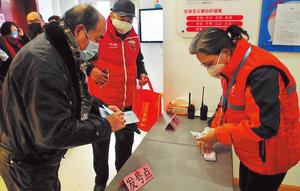Community spirit helps overcome mask shortage
 Guards at Xinjing No 7 Village take visitors' temperature. (XING YI / CHINA DAILY)
Guards at Xinjing No 7 Village take visitors' temperature. (XING YI / CHINA DAILY)
At the end of last month, Shanghai resident Gao Naifang had only five masks left to protect himself and his wife against the novel coronavirus pneumonia outbreak, as all pharmacies in his neighborhood had run out of stock.
However, the 80-year-old was not unduly worried. "I believe the government will resolve the shortage," he said.
Gao was right. On Feb 2, the city launched a plan for mask purchases based on a registration process. Gao completed registration at his community in just minutes, and two days later obtained five masks from a local pharmacy.
This shows that our measures have been successful in the first phase of disease prevention
Wu Fan, vice-president of Shanghai Medical College of Fudan University
He has placed his trust in the hard work of thousands of grassroots officials in communities, whose efforts to enhance prevention against the outbreak have been supported by the megacity's 24 million residents.
Shanghai was one of the first places in the country to mobilize citywide efforts to contain the spread of the epidemic, declaring the highest level of public health emergency on Jan 24.
Treatment at hospitals, disease prevention in communities and screening at city entry points are the "three combination punches" in fighting the virus, Shanghai Mayor Ying Yong said at a meeting on Jan 28.
 A volunteer checks a resident's temperature in Hetai Garden, Shanghai. (XING YI / CHINA DAILY)
A volunteer checks a resident's temperature in Hetai Garden, Shanghai. (XING YI / CHINA DAILY)
Thousands of grassroots officials, joined by as many volunteers, have carried out a range of preventive measures in some 6,000 communities in all 16 districts of Shanghai.
The measures include: monitoring people entering and leaving a specific community to ensure those with suspected symptoms quarantine themselves at home and receive daily assistance during this period; disinfecting public spaces in a community; and spreading knowledge on protective measures.
In Gao's neighborhood, Hetai Garden, a temporary pickup site for deliveries has been set up to minimize the risk of cross-infection, according to Chen Yunshen, director of the residents' committee.
Li Baojia, secretary of the Party branch in the neighborhood, said Party members and volunteers have been mobilized to work with security guards and property management staff members to implement the measures. They are paying special attention to residents returning from other provinces after the Spring Festival holiday.
The Hetai Garden community comprises 852 households, with about one-third of the residents being young renters and the remainder seniors, Li said, adding, "Therefore, we have to come up with ideas on how to communicate with people of different age groups."
However, the shortage of masks, which has affected many residents, proved an exacting challenge.
According to epidemiologists, the virus can spread among humans through tiny droplets of bodily fluid when an infected person sneezes or coughs. Wearing a facemask is an essential method of protection.
On Jan 28, the authorities guaranteed a daily supply of at least 3 million masks to 1,000 pharmacies throughout Shanghai. However, this resulted in long lines forming outside pharmacies, which could not only cause panic but also increase the risk of cross-infection.
As a result, three days later, the municipal government announced the mask purchasing system for local residents. Since Feb 2, they have been able to register at their local neighborhood or village committee with valid identity documents to be guaranteed five masks for each household as soon as supplies arrive.
Since the announcement, Li said he and his colleagues have answered nearly 100 phone calls to explain the policy and give detailed instructions.
To minimize the risk of cross-infection during registration, Chen and his team prepare all the forms in advance. All residents have to do is sign a form to obtain a voucher entitling them to buy masks at a designated pharmacy.
Similar action is being taken in 6,000 local communities throughout Shanghai.
 Yu Xianhua, a Hetai Garden resident, receives a voucher to buy facemasks. (XING YI / CHINA DAILY)
Yu Xianhua, a Hetai Garden resident, receives a voucher to buy facemasks. (XING YI / CHINA DAILY)
In the Chunshen community in Songjiang district, the local committee decided that staff members and volunteers wearing protective clothing should go to each home to distribute vouchers, minimizing the risk of cross-infection. In some other sub-districts of Songjiang, social workers have developed mini-programs on WeChat for online registration.
In Jinshan district, Wang Yan, director of the Jinkang Garden community, and her colleagues phoned people who were about to complete 14 days' quarantine to ensure that could obtain vouchers to buy masks.
In the Xin'an community of Jiading district, registration took place in an open-air square, where community workers used a loudhailer to tell people to stand in line, keeping a distance of 1 meter apart.
According to the Shanghai Civil Affairs Bureau, 2.17 million households completed registration on the first day, accounting for just over 26 percent of the total in the city. The bureau estimated that registration would take four days.
To avoid panic, the municipal government announced that the first registration period would continue through Tuesday, giving people sufficient time to register and an equal opportunity to buy masks.
Liu Ping, an officer with the municipality's Commission of Economy and Informatization, said production of masks in Shanghai has been rising.
All 17 factories manufacturing them in the city resumed work on Jan 30, producing about 1.4 million masks a day, Liu said at a daily news conference to give updates on the outbreak.
Falling cases
By noon on Wednesday, Shanghai had reported about 311 confirmed cases of novel coronavirus pneumonia, with one fatality. This is a relatively small number considering that the city is just a five-hour high-speed train journey from Wuhan, Hubei province, the epicenter of the outbreak, and that nearly 10 million Shanghai residents come from other provinces.
Wu Fan, vice-president of Shanghai Medical College of Fudan University, said that since Jan 30, daily reports of new confirmed cases in Shanghai have been falling.
"This shows that our measures have been successful in the first phase of disease prevention," she said on Shanghai Television on Feb 4.
 Gao Naifang, 80, from the same community, shows his household registration document to obtain a voucher to purchase masks. (XING YI / CHINA DAILY)
Gao Naifang, 80, from the same community, shows his household registration document to obtain a voucher to purchase masks. (XING YI / CHINA DAILY)
Many people have expressed confidence in the city's ability to contain the epidemic, citing its strong grassroots governance at community and sub-district levels, which has continually been strengthened since the 1990s.
Xu Guozhong, a resident of Hetai Garden and a retired civil servant, said the development of governance at grassroots level in Shanghai has taken place in three stages.
In the 1990s, management of sub-districts and communities focused on creating jobs for workers laid off due to the country's transformation from a planned to market-oriented economy.
At the time, Xu worked in a number of posts in the former Zhabei district (now part of Jing'an), and in 1999 he became director of a sub-district. "Back then, managing some 400 small businesses comprised 70 percent of my work," he recalled. "Local officials' main task was to create jobs for people in this kind of street economy."
In the 2000s, sub-district officials began to focus more on attracting investment and fostering economic growth as consolidation of small businesses saw them gradually become pillars of the city's economy, Xu said.
In 2014, focus shifted from promoting economic development to providing public service at grassroots level. The municipal government began to reform sub-district offices, replacing the task of attracting business and investment with public services and strengthening the role of social governance. This was widely viewed as a response to the decision to promote grassroots social governance taken at the third plenum of the 18th Communist Party of China Central Committee in 2013.
Shanghai's 200 sub-districts were restructured, Xu said, with work centering on public service, management and safety.
"Shanghai's effective grassroots governance can be seen in the successful implementation of the fireworks ban in 2015 and the garbage classification program in 2019," Xu said.
Amid the novel coronavirus outbreak, the city has faced the second stage of the prevention challenge as increasing numbers of people returned from the Spring Festival break.
"We shouldn't loosen our efforts," Wu said.
Many residents are optimistic, including Gao, from Hetai Garden.
"I have faith that we can withstand attack from this epidemic," he said.


